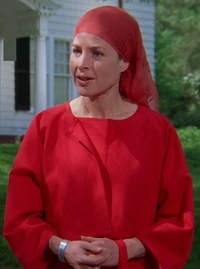The Handmaid's Tale is a 1990 film adaptation of the Margaret Atwood novel of the same name. Directed by Volker Schlöndorff, the film stars Natasha Richardson (Kate/Offred), Faye Dunaway (Serena Joy), Robert Duvall (The Commander, Fred), Aidan Quinn (Nick), and Elizabeth McGovern (Moira).
The screenplay was written by Harold Pinter. The original music score was composed by Ryuichi Sakamoto. MGM Home Entertainment released an Avant-Garde Cinema DVD of the film in 2001. The film was entered into the 40th Berlin International Film Festival.
Plot Summary[]
In the near future, war rages across the fictional Republic of Gilead and pollution has rendered 99% of the population sterile. Kate is a woman who attempts to emigrate to Canada with her husband and daughter. As they take a dirt road, the Gilead Border Guard order them to turn back or they will open fire. Kate's husband uses an automatic rifle to draw the fire, telling Kate to run, but he gets shot. Kate gets captured, whilst their daughter wanders off into the backcountry, confused and unaccompanied. The authorities take Kate to a training facility with several other women, where she and her companions receive training to become Handmaids - concubines for one of the privileged but barren couples who run the country's religious fundamentalist regime. Although she resists being indoctrinated into the cult of the Handmaids, which mixes Old-Testament orthodoxy with 12-step gospel scripted group chanting and ritualized violence, Kate is soon assigned to the home of The Commander and of his cold, inflexible wife, Serena Joy. There she is named "Offred" - "of Fred".
Her role as the Commander's latest concubine is emotion-free, as she lies between Serena Joy's legs Aunts and Aunt Lydia singing while being penetrated by the Commander in the collective hope that she will bear them a child. Kate continually longs for her earlier life, and is haunted by nightmares of her husband's death and of her daughter's disappearance. A doctor tells her that many of Gilead's male leaders are as sterile as their wives. Serena Joy desperately wants a baby, so she convinces Kate to risk the punishment for fornication — death by hanging — in order to be fertilized by another man who may make her pregnant, and consequently, spare her life. In exchange for Kate agreeing to this, Serena Joy provides information to Kate that her daughter is alive, and shows as proof a recent photograph of her living in the household of another Commander. However, Kate is told she can never see her daughter. The Commander also tries to get closer to Kate, believing that if she enjoyed herself more she would become a better handmaid. The Commander gets Kate hard-to-obtain items, and, knowing her background as a librarian, allows her access to his private library. However, during a night out, the Commander has sex with Kate in a manner that is probably not intended for pregnancy. The other man selected by Serena Joy turns out to be Nick, the Commander's sympathetic chauffeur. Kate grows attached to Nick and eventually becomes pregnant with his child.
Kate ultimately kills the Commander, and a police unit then arrives to take her away. She thinks that the policemen are members of the Eyes, the government's secret police. However, it turns out that they are soldiers from the resistance movement, Mayday, which Nick, too, is a part of. Kate then flees with them, parting from Nick in an emotional scene.
In the closing scene, Kate is once again free and wearing non-uniform clothes, but facing an uncertain future. She is living by herself, pregnant in a trailer whilst receiving intelligence reports from the rebels. She wonders if she will be reunited with Nick, but expresses hope that will happen, and resolves with the rebels' help she will find her daughter.
Cast[]
- Natasha Richardson as Kate
- Faye Dunaway as Serena Joy
- Aidan Quinn as Nick
- Elizabeth McGovern as Moira
- Victoria Tennant as Aunt Lydia
- Robert Duvall as Commander Fred
- Blanche Baker as Ofglen
- Traci Lind as Ofwarren/Janine
- Aunt Helena
- Aunt Elizabeth
- Luke
- Cora
- Aunt Sara
- Rita
- June
- Dick
- Alma
- Aunt Christina
- Mrs. Warren
- Steve
- Ofglen #2
- Jill
Differences from the Book & TV Series[]
The film differs from the book and the series in many ways. Some of the most significant differences include:
- Offred's real name is stated to be Kate in the film. In the book, her real name is never revealed, though it is hinted it could be June. In the series, her name is June.
- Luke is confirmed to be dead in the film, while in the book his fate is more ambigious. In the series, Luke is alive and has an active presence in the show.
- Offred ends up killing the Commander in the film; in the book, she does no such thing and it is implied the Commander may later have been executed by the regime. In the series, she and other escaped handmaids chase him down and kill him in their own version of a Particicution.
- Offred first meets Moira at the Red Center in the film; in the book and the series they have known each other since adolescence.
- Nick is confirmed to be a member of Mayday in the film, whereas in the book his role is more ambiguous. In the TV series, Nick has stronger ties to Gilead.
- Commander Fred seems to be Offred's first posting. In the TV series, it is her second posting. In the novel, his household is her third posting.
- Offred's fate is left ambiguous in the novel; in the film, she is shown escaping from Gilead with Mayday's help and living in a trailer, her future uncertain, but free. In the series, Offred has escaped to Canada.
- Offred is shown to be pregnant with Nick's child at the end of the film. In the novel, Offred believes she could be pregnant, but it is too early to tell and was never confirmed. In the series, she had Nick's child - Nichole.
- The film does not include the novel's epilogue, where it is revealed Offred recorded her story on cassette tapes. In the series, Offred records a message on a cassette tape to send to Luke in Canada.
- Handmaids in the film don't wear the white 'wing-like' headdresses described in the novel and in the TV series, but rather simple red veils.
- In the film there are survivors of the US Government including the Vice President who would retreat to a secured location. In the show the Vice President would be killed.
- In the film, Resistance would begin after the Provisional Government of White Supremacists would immediately outlaw non-whites from society, as well as communists. The Sons of Jacob took power immediately after they attacked the US Government. The Vice president survived along with a few members of the US Government who didn't change sides. In the TV series, the Provisional Government would briefly consist of men and women and would later discover that most of their group was involved in the attack. The Provisional Government was forced to flee to Canada as it was outnumbered 1st in New York City and then Alaska.
- In the film, all religions not belonging to the Sons of Jacob are outlawed immediately with the exception of the Catholic Church, who tried and failed to reach an agreement with the Republic of Gilead to keep the Church legal. Quakers would be allowed to practice their faith but would be shut down. The status of the Amish is unknown in both the film and TV series, but many seem to have fled to Canada or Europe before any action is taken against them. In the TV series, the process of the formation of the Republic of Gilead laws takes a month to 2 months after they seized the entire Eastern Seaboard. However many laws of Gilead after the early formation either are slow to implement or not introduced at all
- In the film, the new Government is quick to form a border wall In the TV series the republic of Gilead never constructs a border wall as it slowly takes over but is overwhelmed by fighting.
- In the film, the Republic of Gilead are quick to reach 44 out of 48 lower states due to being popular with the majority of the white, non-Jewish population In the TV series the Republic of Gilead takes a year to reach Chicago and a few years to take half of the Pacific Coast. It loses Texas and portions of Louisiana plus small portions of New Mexico.
Awards[]
- Berlin International Film Festival, Golden Berlin Bear Award, 1990 (Nominated)
- Evening Standard British Film Awards, 1991, Evening Standard British Film Award
- GLAAD Media Awards, 1991, GLAAD Media Award
Critical Reception[]
Overall, the film was not well received at the time. Rotten Tomatoes reports that only 5/16 critics gave the film a positive review; the average rating was 4.8/10.
Roger Ebert gave the film 2/4 stars and wrote that he was "not sure exactly what the movie is saying" and that by "the end of the movie we are conscious of large themes and deep thoughts, and of good intentions drifting out of focus."
Owen Gleiberman,for Entertainment Weekly, gave the film a "C-" grade. He commented that "visually, it's quite striking", but that it is "paranoid poppycock — just like the book". 1
Roger Ebert declared, “For all of its anger, The Handmaid's Tale is curiously muted.”
Peter Travers, of Rolling Stone, also gave it a horrible review. He said, “This Handmaid's Tale is merely a piss-poor rehash of The Stepford Wives with delusions of grandeur.” Empire magazine was just as harsh, saying, “Comes across as a TV movie and overall, a disappointment – a high calibre cast and concept completely squandered.” 2
Releases[]
The Handmaid's Tale film was released on DVD and Blu-ray.
Video Gallery[]
Photo Gallery[]
Quote[]
“Oh, God from whom all blessings flow hear us, your daughters here below. They house the vessels of the seed of those who come to us in need; remove our anger cleanse our will, and leave us empty to refill” — Aunts
“Let us pray. Oh, God, make us fruitful.” — Aunt Lydia
“ I'll be walking by the river With my serenity thank we, dear God, for the river And for true virginity Bless us maids, God bless us Bless us with virginity” — Kate and Handmaids














